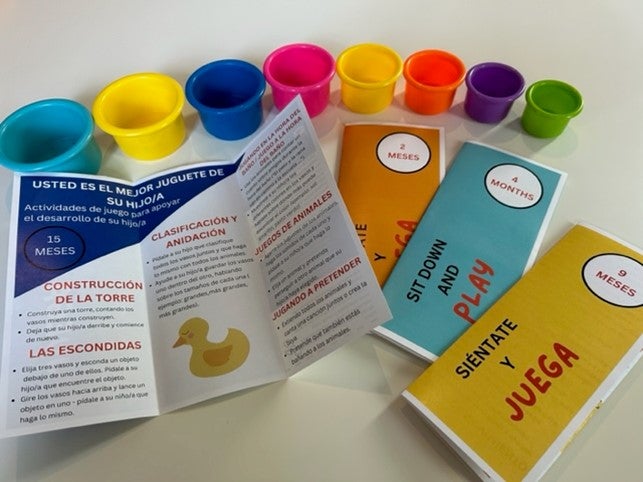Collaborating with Latino Families to Adapt an Early Child Development Intervention
sit and play

Sit Down and Play
The quality of a child’s home learning environment during the first two years of life can greatly influence their future educational and health outcomes. Responsive parenting behaviors and access to stimulating activities are key to fostering early child development. However, social determinants of health (SDOH), including poverty and structural racism, lead to unequal access to such learning environments. These SDOH contribute to racial, ethnic, and socio-economic disparities in early child development and kindergarten readiness.
With the influence of SDOH on learning environments in mind, our study team is undergoing a research project to adapt the parenting intervention, Sit Down & Play (SDP), to respond to the needs and preferences of Latino families in Chicago. Developed by Dr. Reshma Shah, a developmental pediatrician and researcher at University of Illinois (UI) Health, SDP is a parent-directed program that is delivered during well-child visits for children 2-24 months of age. SDP encourages interactive parenting in the context of play and is structured around a set of inexpensive, age-appropriate toys (e.g., a rattle for 2-month-olds; nesting cups for 15-month-olds). SDP has previously been implemented in UI Health clinics and in India. However, it has not been widely available for Latino families in the United States. In this study, we are tailoring SDP to make it accessible for families that receive care from Esperanza Health Centers (also referred to as Esperanza), a Federally Qualified Health Center (FQHC) that offers fully bilingual healthcare to residents of Chicago’s southwest side regardless of their insurance or immigration status.
Partnership Development and Formative Research
Our partnership with Esperanza has been essential to this study. To establish this community-research partnership, we worked closely with Dr. Mark Minier, Esperanza’s Medical Director of Pediatrics and School-Based Health Services, who has been a champion of this project from the start. From June-August 2023, we enrolled a total of 32 parent-child dyads during well-child visits at Esperanza and delivered the SDP module that corresponded to each child’s age.
Each SDP interaction involved interpersonal counseling, providing the parents with an age-appropriate toy for their child and informational pamphlet, giving the parents an opportunity to try out a recommended activity, and offering positive reinforcement.
We then conducted follow-up phone interviews approximately one month after the clinic visit. During these interviews, our aim was to treat the families not as research subjects, but as consultants whose attitudes and opinions are of great value.
quote 1
We explored participants’ experiences with the SDP toy and activities, challenges encountered, suggestions for changes and asked participants their honest opinions about SDP – both the good and the bad – to help us ensure that SDP would be as useful as possible for Esperanza families like theirs in the future.
text 2
Next Steps
Our goal is to integrate SDP into the routine pediatric workflow at Esperanza to make it available at every well-child visit during children’s first two years of life. Based on findings from the first phase of research, our team is modifying the SDP handouts and the protocol for intervention delivery and will then conduct a pilot study utilizing pediatric medical assistants to deliver the adapted intervention.
We are extremely grateful to P3RC for funding our study and to Esperanza Health Centers for their support and collaboration in this work.
Esperanza Health Centers delivers hope and health to Chicago’s underserved communities.
About the author
Jessica Rothstein is a Clinical Assistant Professor and Principal Investigator at the University of Illinois at Chicago, School of Public Health within the Community Health Sciences division. Through her mixed methods research she aims to improve child nutrition, health, and development.